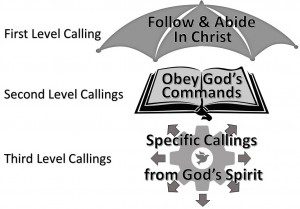![]() Skye Jethani, in a great insight in his book, Futureville (and also discussed in this article from The High Calling / Theology of Work Project), delineates three levels of calling.
Skye Jethani, in a great insight in his book, Futureville (and also discussed in this article from The High Calling / Theology of Work Project), delineates three levels of calling.
- The highest level of calling is when Jesus calls to us “Follow Me,” and our continued abiding in communion with Christ,
- The second level of calling is the common calling for all Christians to obey the commands of Scripture (instructions to love one another, pray for those who persecute you, forgive those who wrong you, give to those in need, honor your father and mother, do not steal, do not covet, do not commit adultery, be prepared to share about your hope in Christ, and hundreds of other commands),
- The third level of calling is the specific vocations that each individual has that cannot be discovered without the illuminating role of the Holy Spirit), he sees a problem.
But if this is true, then this unmasks a problem with how churches are equipping their people.
“In many of our Christian communities there is a functional denial of the Holy Spirit. We may affirm the Spirit as a doctrinal truth, but the reality of his presence is often ignored. As a result, Christians are not equipped to engage their highest calling (communion with God) or to discern their specific calling (vocation). What remains is the one thing the church can access without the Spirit’s presence—the Scripture.” (Futureville: Discover Your Purpose for Today by Reimagining Tomorrow (Thomas Nelson, 2014), p 104)
Neglected Levels of Calling
 Jethani believes that since we church leaders have been so focused on the secondary calling that is common to all Christians—to believe, obey, and apply the commands that Scripture has for all Christians—that we have neglected the other levels of calling. We have not created a culture that develops the kind of disciples that are so connected with the Holy Spirit that they are able to discern their specific callings.
Jethani believes that since we church leaders have been so focused on the secondary calling that is common to all Christians—to believe, obey, and apply the commands that Scripture has for all Christians—that we have neglected the other levels of calling. We have not created a culture that develops the kind of disciples that are so connected with the Holy Spirit that they are able to discern their specific callings.
He states that since church leadership does not help congregants connect intimately with the Holy Spirit, these individuals are not equipped to discern their specific vocations. This leads to confusion because the only callings that are proclaimed from pulpits and talked about in Bible studies are those calling that are common to all Christians—things like “make disciples” or to be “witnesses of Jesus Christ.”
Please don’t take this wrong! Believers do indeed need to be taught and trained in righteousness.
While the secondary calling is certainly biblically mandated for all Christians, Jethani claims,
“When these callings are untethered from our highest calling (communion with God) or the specific vocations Christ has given to each of his followers, it can do great damage. When this happens, the institutional church’s work soon becomes all-consuming, and many Christians develop a suspicion that the church’s leaders really only care about advancing their institution’s agenda.” (p. 105)
What do you think of this provocative proposal?
Image by Bob Robinson













